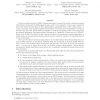Free Online Productivity Tools
i2Speak
i2Symbol
i2OCR
iTex2Img
iWeb2Print
iWeb2Shot
i2Type
iPdf2Split
iPdf2Merge
i2Bopomofo
i2Arabic
i2Style
i2Image
i2PDF
iLatex2Rtf
Sci2ools
IACR
2016
2016
More Practical and Secure History-Independent Hash Tables
Direct-recording electronic (DRE) voting systems have been used in several countries including United States, India, and the Netherlands to name a few. In the majority of those cases, researchers discovered several security flaws in the implementation and architecture of the voting system. A common property of the machines inspected was that the votes were stored sequentially according to the time they were cast, which allows an attacker to break the anonymity of the voters using some side-channel information. Subsequent research (Molnar et al. Oakland’06, Bethencourt et al. NDSS’07, Moran et al. ICALP’07) pointed out the connection between vote storage and history-independence, a privacy property that guarantees that the system does not reveal the sequence of operations that led to the current state. There are two flavors of history-independence. In a weakly history-independent data structure, every possible sequence of operations consistent with the current set of items is e...
Biometrics | IACR 2016 |
| Added | 03 Apr 2016 |
| Updated | 03 Apr 2016 |
| Type | Journal |
| Year | 2016 |
| Where | IACR |
| Authors | Michael T. Goodrich, Evgenios M. Kornaropoulos, Michael Mitzenmacher, Roberto Tamassia |
Comments (0)

